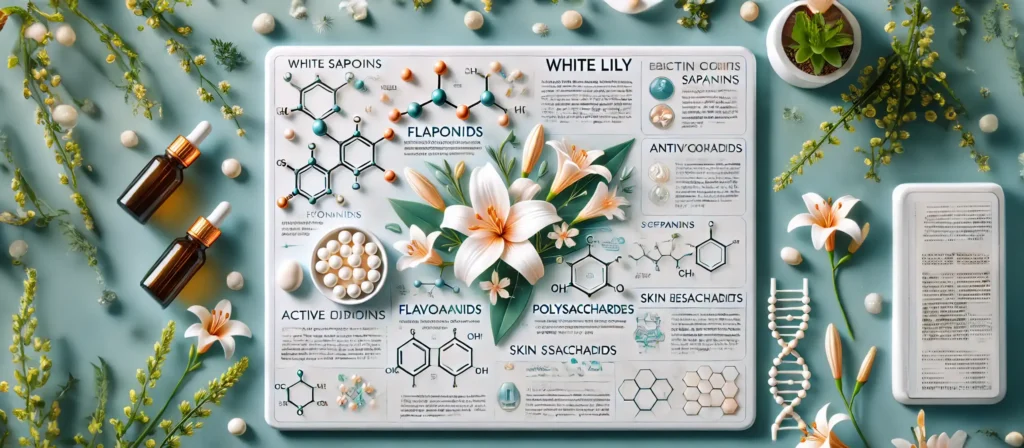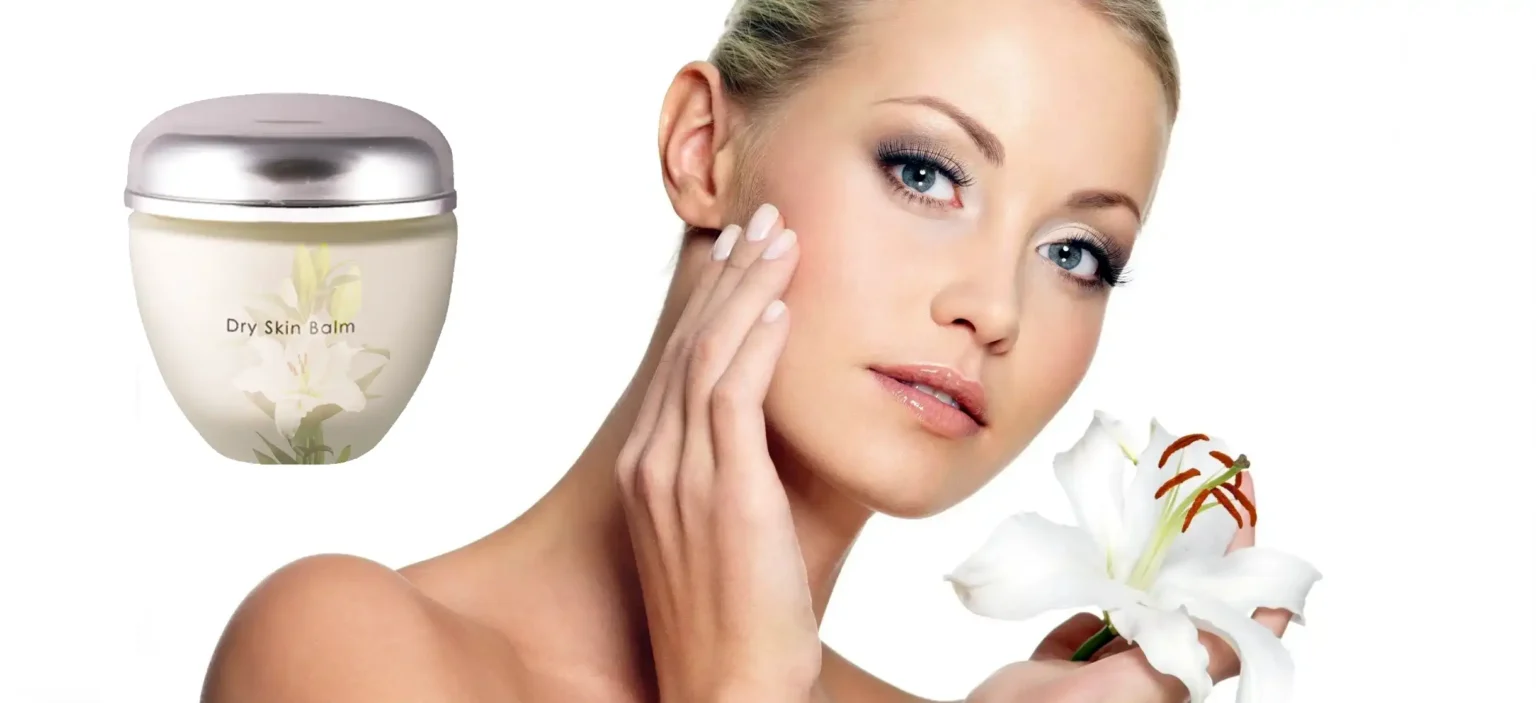The beauty industry is increasingly turning to nature for inspiration, seeking ingredients that not only promise efficacy but also embrace ecological sustainability. Among the myriad of botanicals gracing skincare formulations, the white lily stands out for its profound benefits. This begs the question, “Is white lily good for skincare?” The answer unfolds as we delve into the properties of this elegant bloom.
White Lily in Skincare
Historically revered for its exceptional purity and soothing properties, the white lily is more than just a symbol of grace. It’s a powerhouse in skincare, renowned for its ability to hydrate, reduce inflammation, and lighten skin blemishes. The extracts from this delicate flower are infused in various skincare products, aimed at harnessing its rich, skin-enhancing nutrients.

Trend Towards Botanical Ingredients
As consumers become more conscious of the ingredients in their skincare products, there’s been a marked shift towards formulations that include natural substances. White lily, along with other botanical ingredients, is at the forefront of this trend. Its popularity is driven by its effectiveness and the growing demand for products that are both gentle on the skin and environmentally friendly.
This integration of white lily into skincare routines worldwide is not just a trend but a return to age-old beauty secrets that utilize the purest forms of nature. As we explore the specific benefits of white lily in skincare, it becomes clear why this ingredient is becoming a staple in beauty regimens geared towards achieving radiant and youthful skin.
What is White Lily?
The white lily, a symbol of purity and refined beauty, has long been esteemed not only for its serene aesthetic but also for its remarkable benefits in skincare. This section delves into the botanical specifics of the white lily and its esteemed place in traditional medicine and beauty treatments.
Botanical Description The white lily, classified scientifically under the genus Lilium, encompasses several species commonly utilized in skincare, such as Lilium candidum (Madonna lily) and Lilium longiflorum. These lilies are known for their majestic white flowers, which emit a gentle, soothing fragrance. They thrive in temperate climates and are cultivated extensively for their decorative and medicinal values.
Types Used in Skincare In the realm of skincare, Lilium candidum is particularly revered. This species is favored for its high content of beneficial compounds like saponins, flavonoids, and polysaccharides, which are known for their hydrating, soothing, and skin-repairing properties.
Historical Uses Historically, white lilies have been integral to traditional remedies across various cultures. In ancient Greek and Roman societies, white lily macerations were used to treat skin wounds, burns, and scars due to their soothing and anti-inflammatory properties. In medieval times, distilled water from white lilies was commonly applied to soften the skin, reduce wrinkles, and brighten the complexion.
In Eastern traditions, particularly in China and Japan, white lily bulbs have been used in poultices and ointments to treat a range of skin ailments, from burns to ulcers and inflammation. These uses highlight the lily’s enduring role in natural beauty and healthcare practices.

Continued Relevance in Modern Skincare Today, the white lily’s legacy continues as it is incorporated into numerous skincare products for its hydrating, brightening, and soothing benefits. It is especially valued in formulations designed for sensitive and mature skin types, where its gentle, reparative properties can be most beneficial.
Key Components of White Lily and Their Benefits for Skin Health
White lily, revered not only for its ethereal beauty but also for its substantial benefits in skincare, contains several active compounds that are crucial for maintaining healthy skin. These natural components, each with unique properties, work synergistically to enhance skin health, making white lily a favored ingredient in many skincare products.
Active Compounds in White Lily:
- Saponins: These are natural surfactants that possess cleansing and antimicrobial properties, making them effective in purifying the skin and removing impurities. Saponins also help in moisturizing the skin by improving hydration levels, thereby maintaining the skin’s barrier function.
- Flavonoids: Known for their potent antioxidant properties, flavonoids in white lily protect the skin from environmental stressors like UV radiation and pollution. They combat free radicals, reducing oxidative stress and preventing premature aging of the skin.
- Polysaccharides: These are responsible for the moisturizing effects of white lily. Polysaccharides form a protective barrier on the skin that helps to lock in moisture and keep the skin hydrated. This action not only improves skin elasticity but also makes the skin appear plumper and more vibrant.
- Glycosides: Glycosides from white lily help in skin lightening and brightening by inhibiting melanin production. They are beneficial in reducing the appearance of dark spots and evening out skin tone, leading to a clearer and more radiant complexion.
How These Compounds Benefit the Skin:
- Hydration: The high content of polysaccharides in white lily helps in maintaining the moisture balance of the skin, essential for keeping the skin supple and plump.
- Anti-Inflammatory: Both saponins and flavonoids have anti-inflammatory properties that help reduce skin redness, swelling, and irritation, making white lily ideal for sensitive and acne-prone skin.
- Anti-Aging: Flavonoids help protect the skin from premature aging by neutralizing free radicals and reducing the damage they cause.
- Brightening: Glycosides aid in skin brightening and lightening by reducing melanin production, thus helping to clear up pigmentation and promote an even skin tone.
These components of white lily not only address specific skin issues but also contribute to overall skin health, promoting a youthful and radiant complexion.

Hydrating Properties of White Lily
In the realm of skincare, hydration is paramount for maintaining a healthy, radiant complexion. White lily extract is renowned for its exceptional hydrating properties, making it a prized ingredient in many moisturizing products. This section explores how white lily extract contributes to skin hydration and compares it with other popular hydrating ingredients.
Hydration Benefits of White Lily Extract: White lily extract is rich in polysaccharides, natural molecules that play a critical role in the skin’s hydration process. These polysaccharides help to form a barrier on the skin that retains moisture, preventing dehydration. Additionally, the extract has a soothing effect, reducing potential irritation and inflammation which can compromise the skin’s barrier function.
- Moisture Retention: The mucilaginous substances in white lily extract can bind water to the skin, ensuring prolonged hydration.
- Barrier Enhancement: By reinforcing the skin’s natural barrier, white lily extract helps to lock in moisture and protect against environmental stressors that can lead to dryness.
Comparison with Other Hydrating Ingredients: While white lily extract is effective, it’s helpful to understand how it stands alongside other hydrating ingredients:
- Hyaluronic Acid: Known for its ability to hold up to 1000 times its weight in water, hyaluronic acid is a powerhouse for deep hydration. White lily extract complements this by forming a barrier that helps keep this moisture in the skin.
- Glycerin: A humectant like hyaluronic acid, glycerin draws moisture from the air into the skin. White lily’s barrier-forming properties can enhance the effectiveness of glycerin by ensuring the moisture doesn’t evaporate quickly from the skin.

These comparisons show that while other ingredients are effective in attracting moisture, white lily extract excels in sealing this moisture within the skin, providing a dual action that is beneficial in any hydrating skincare regimen.
Integrating White Lily Extract in Skincare: Given its benefits, incorporating white lily extract into your skincare routine can significantly enhance your skin’s hydration levels. It is especially beneficial in serums, face masks, and night creams where it can support the skin’s overnight repair process.
White Lily for Inflammation and Redness
White lily has been celebrated not only for its beauty but also for its potent anti-inflammatory properties, which make it an excellent choice for calming irritated skin and reducing redness. This part of the blog delves into the mechanisms behind white lily’s effectiveness in treating skin inflammation and presents research that supports its use in skincare.
Anti-Inflammatory Properties of White Lily: White lily extract contains several compounds that contribute to its anti-inflammatory effects. Notably, it is rich in saponins and flavonoids, which are known for their ability to soothe the skin and reduce inflammation. These compounds inhibit various pathways in the inflammatory process, thereby decreasing the occurrence of redness, swelling, and discomfort in the skin.
- Saponins: These compounds reduce the production of certain inflammatory markers in the skin, helping to calm areas of irritation and make the skin less reactive to external aggressors.
- Flavonoids: With strong antioxidant properties, flavonoids help to neutralize free radicals that can lead to inflammation and skin damage. They also modulate the activity of enzymes and cytokines involved in the inflammatory response.
Research and Case Studies: Several studies have highlighted the effectiveness of white lily in reducing skin inflammation:
- Laboratory Studies: Research conducted in vitro has shown that white lily extract can significantly reduce the production of pro-inflammatory cytokines in skin cells, which are key players in the inflammatory response.
- Clinical Trials: Case studies involving subjects with conditions such as eczema and rosacea have demonstrated that topical application of white lily extract leads to visible reductions in skin redness, itching, and inflammation.
These findings suggest that white lily can be a valuable ingredient in treatments aimed at soothing sensitive skin and reducing the symptoms of inflammatory skin conditions.
Using White Lily in Skincare: To harness these benefits, look for serums, creams, and masks that list white lily extract as a key ingredient. Products formulated for sensitive or reactive skin often incorporate white lily due to its soothing properties. Regular use can help manage flare-ups and maintain skin comfort.
Anti-Aging Benefits of White Lily
White lily is not only known for its soothing and hydrating properties but also for its potent anti-aging effects. This section explores how white lily contributes to anti-aging skincare regimens and the role its antioxidants play in preventing skin aging.
Contribution to Anti-Aging Skincare: White lily extract is highly valued in anti-aging products due to its ability to address several signs of aging. Here’s how it works:
- Moisturization: White lily is rich in polysaccharides, which help maintain the skin’s hydration levels. Well-hydrated skin appears plumper, smoother, and more radiant, reducing the appearance of fine lines and wrinkles.
- Skin Tone and Texture: Regular use of white lily can improve skin texture and tone. It helps in the gentle exfoliation of the skin, promoting cell regeneration which results in brighter and more even skin.
Role of Antioxidants: The natural antioxidants found in white lily, such as flavonoids, play a crucial role in combating skin aging:
- Protection from Oxidative Stress: These antioxidants protect the skin from oxidative stress caused by free radicals and environmental aggressors like UV radiation and pollution. By neutralizing these harmful particles, white lily extract helps prevent the breakdown of collagen and elastin—key proteins responsible for maintaining the skin’s structural integrity and elasticity.
- Reduction of Inflammation: Antioxidants in white lily also reduce inflammation, a key contributor to premature aging. Chronic inflammation can lead to a breakdown of collagen and elastin, so by mitigating these inflammatory processes, white lily helps maintain youthful skin.
Integrating White Lily into Your Routine: Incorporating white lily into your skincare routine can be done through various products like serums, creams, and face masks specifically formulated for anti-aging. For best results, products containing white lily should be used consistently as part of your daily skincare regimen to effectively delay the signs of aging and maintain the skin’s youthful vitality.
White Lily for Acne and Sensitive Skin
White lily is celebrated not only for its beauty and soothing properties but also for its efficacy in treating acne-prone and sensitive skin. This section discusses the benefits of white lily for these skin types and provides practical tips on how to incorporate white lily products into your skincare routine.
Benefits of White Lily for Acne-Prone and Sensitive Skin:
- Soothing Irritation: White lily extract has natural anti-inflammatory properties that help reduce skin irritation and redness. For sensitive skin, this means less discomfort and an overall calming effect.
- Reducing Redness: The soothing capabilities of white lily are particularly beneficial for acne-prone skin, where inflammation can lead to prominent redness. Regular use can help diminish the appearance of red, inflamed blemishes.
- Promoting Healing: White lily contains polysaccharides which help to promote the regeneration of skin cells. This accelerates the healing process of acne scars and other minor skin abrasions, making it a valuable component in post-acne treatment.
Tips on Using White Lily Products:
- Choose the Right Product: Look for serums, creams, or toners that list white lily extract as a key ingredient. Ensure that the product is suitable for sensitive or acne-prone skin, with minimal harsh chemicals.
- Gentle Application: Apply white lily products gently to the skin using clean fingertips or a cotton pad. Avoid rubbing vigorously to prevent further irritation.
- Consistency is Key: For best results, incorporate white lily products into your daily skincare routine. Consistent use can lead to significant improvements in skin texture and clarity.
- Patch Testing: Always perform a patch test before fully integrating a new product into your routine, especially if you have sensitive skin. This can help you avoid adverse reactions.
Integrating into Your Skincare Routine: Using white lily products can be a game-changer for managing sensitive or acne-prone skin. Include these products in both your morning and evening routines to maximize their soothing and healing effects. Over time, you may notice a reduction in skin irritation, less frequent acne breakouts, and a healthier-looking complexion.
How to Use White Lily in Your Skincare Routine
Incorporating white lily into your skincare routine can enhance your skin’s appearance and health, leveraging its soothing, hydrating, and rejuvenating properties. Here are practical tips for using white lily products daily and some DIY treatments you can try at home.
Daily Use of White Lily Products:
- Cleansers and Toners: Start your day by cleansing your skin with a white lily-infused cleanser to remove impurities while soothing the skin. Follow up with a white lily toner to help balance the skin’s pH and prepare it for further treatment.
- Serums and Moisturizers: Apply a serum or moisturizer containing white lily extract to help hydrate and protect your skin. These products are particularly beneficial for reducing inflammation and enhancing the skin’s natural barrier.
- Night Creams: Use a night cream with white lily extracts to support skin regeneration during sleep. Its anti-inflammatory and hydrating properties work overnight to improve skin texture and tone.
DIY White Lily Skincare Treatments:
- White Lily Face Mask:
- Ingredients: Fresh white lily petals, 1 tablespoon of honey, 2 tablespoons of Greek yogurt.
- Instructions: Crush the white lily petals in a bowl and mix with honey and yogurt to form a paste. Apply the mask to your face and leave it on for 15-20 minutes before rinsing off with warm water. This mask will hydrate and calm the skin, reducing redness and irritation.
- White Lily Toner:
- Ingredients: 100ml of distilled water, 10 fresh white lily petals.
- Instructions: Boil the white lily petals in distilled water for 5 minutes. Let the mixture cool, then strain the liquid into a clean bottle. Use this toner daily after cleansing to refresh and soothe your skin.
Tips for Maximizing Benefits:
- Consistency: Regular use of white lily products is key to achieving noticeable results. Incorporate them into your routine consistently to benefit from their properties.
- Patch Test: Always perform a patch test before trying a new product or DIY treatment, especially if you have sensitive skin.
By integrating white lily into your skincare routine, you can enjoy its multiple benefits and help maintain a radiant, healthy complexion. Whether you opt for commercial products or prefer DIY treatments, white lily can be a valuable addition to your skincare arsenal.
Top White Lily Skincare Products
Incorporating white lily extract into your skincare routine can offer numerous benefits, from reducing inflammation to enhancing hydration. Below, we review some of the best skincare products containing white lily extract and offer tips on what to look for when selecting these products.

Review of the Best White Lily Skincare Products:
- White Lily Radiance Serum: This serum is formulated with high concentrations of white lily extract to brighten and even out skin tone while providing deep hydration. It’s perfect for those looking to reduce dark spots and enhance their skin’s natural glow.
- Soothing White Lily Night Cream: Ideal for sensitive or irritated skin, this night cream uses white lily to calm redness and repair skin overnight. Its rich texture also helps lock in moisture, making it a great choice for dry skin types.
- White Lily Hydrating Toner: This toner combines white lily extract with aloe vera to provide a soothing and hydrating experience. It prepares the skin for serums and moisturizers by restoring its pH balance and enhancing ingredient absorption.
- White Lily and Chamomile Gentle Cleanser: Suitable for all skin types, this cleanser gently removes impurities without stripping the skin of its natural oils. White lily and chamomile work together to soothe and soften the skin.
What to Look for When Choosing a White Lily Skincare Product:
- Ingredient Concentration: Check the ingredient list to ensure that white lily extract is among the top five ingredients, which indicates a higher concentration and potential effectiveness.
- Complementary Ingredients: Look for products that combine white lily with other beneficial ingredients like hyaluronic acid or vitamin C to enhance the overall skincare benefits.
- Product Purity: Opt for products free from harmful chemicals such as parabens, sulfates, and phthalates, which can irritate the skin and detract from the benefits of white lily.
- Packaging: Ensure the product is well-packaged to protect the integrity of white lily extracts, preferably in opaque containers that limit exposure to light.
User Experiences and Testimonials: The Impact of White Lily in Skincare
The transformative power of white lily in skincare is not just clinically supported but also vividly illustrated through the experiences of real users. These testimonials showcase the significant improvements in skin health and appearance attributed to products enriched with white lily extract.
Testimonials Overview:
- Sarah’s Journey with White Lily Serum:
- Before: Sarah struggled with uneven skin tone and persistent redness.
- After: After using white lily serum twice daily for eight weeks, her skin tone evened out, and the redness diminished significantly.
- Quote: “I never imagined something as natural as white lily could make such a difference. My skin hasn’t just improved; it has transformed!”
- Mike’s Experience with White Lily Night Cream:
- Before: Mike dealt with dry, flaky skin, especially in colder months.
- After: Regular use of a white lily-infused night cream restored hydration, leaving his skin smoother and more resilient.
- Quote: “This cream is a game-changer. It’s like my skin drinks it up every night, and I wake up with a refreshed, hydrated complexion.”
- Anita’s Results from White Lily Face Masks:
- Before: Anita suffered from sensitivity and occasional flare-ups of dermatitis.
- After: Incorporating white lily face masks into her weekly routine has reduced her skin’s sensitivity and controlled inflammation.
- Quote: “White lily masks have soothed my irritated skin better than anything else I’ve tried. It’s gentle yet effective!”
These personal stories highlight not only the effectiveness of white lily in treating various skin conditions but also its role in enhancing overall skin quality. Each testimonial underscores the ingredient’s ability to hydrate, soothe, and rejuvenate the skin, making it a valuable addition to any skincare regimen.
Precautions and Considerations for Using White Lily in Skincare
While white lily is celebrated for its numerous benefits in skincare, it’s crucial to approach its use with caution to avoid potential side effects or allergic reactions. This section discusses important safety measures and offers advice on how to safely incorporate white lily into your skincare regimen.
Potential Side Effects and Allergic Reactions:
- Allergic Reactions: Although rare, some individuals may experience allergic reactions to white lily, especially those with sensitive skin or known allergies to lilies or similar plants.
- Skin Irritation: In some cases, topical application of white lily extract can cause skin irritation, redness, or rash, particularly if the concentration is too high or if the product is not well-formulated.
Advice on Safe Usage:
- Patch Testing: Before incorporating any new product containing white lily extract into your routine, perform a patch test. Apply a small amount of the product on a discreet area of skin, such as the inside of your wrist or behind the ear. Monitor the area for 24 to 48 hours for any adverse reactions.
- Consultation with Dermatologists: If you have sensitive skin or are prone to allergies, consult with a dermatologist before using white lily products. This is especially important if you’re considering using products with a high concentration of white lily extract.
Tips for Choosing White Lily Skincare Products:
- Quality and Purity: Opt for high-quality products from reputable brands that use pure white lily extract without unnecessary additives that could irritate the skin.
- Ingredient Concentration: Be mindful of the concentration of white lily extract in skincare products. Products with too high a concentration may increase the risk of skin irritation, especially for sensitive skin types.
The Future of White Lily in Skincare
The future of white lily in the skincare industry looks promising, driven by ongoing research and a growing appreciation for botanical ingredients. This section provides insights into what the future holds for white lily as a key component in skincare formulations.
Ongoing Research:
- Enhanced Efficacy: Scientists are exploring ways to increase the bioavailability of the active compounds in white lily to enhance their efficacy when applied topically. This involves advanced extraction techniques and nano-formulations that ensure deeper penetration of these compounds into the skin.
- New Benefits: Research is continuously uncovering new benefits of white lily in skincare. Recent studies focus on its potential anti-microbial and anti-viral properties, which could open new avenues for its use in treating a broader range of skin conditions.
Future Prospects:
- Innovative Product Formulations: As the benefits of white lily become more well-known, skincare brands are likely to innovate with new types of products incorporating this ingredient. Expect to see more targeted treatments, such as serums and spot treatments, that harness the specific properties of white lily.
- Sustainability Focus: With an increasing focus on sustainability in the beauty industry, the cultivation of white lilies for skincare purposes is likely to adopt more eco-friendly practices. This includes organic farming and the use of renewable energy sources in the production processes.
Trends in Botanical Ingredients:
- Consumer Demand: The trend towards natural and botanical ingredients is strengthening, with consumers increasingly seeking products that are both effective and gentle. White lily, known for its soothing and hydrating properties, fits well within this demand.
- Holistic Skincare: There is a growing trend towards holistic approaches in skincare, where ingredients like white lily are valued not just for their aesthetic benefits but also for their therapeutic properties.
The ongoing advancements and growing consumer interest suggest that white lily will continue to be a valuable ingredient in skincare products, offering benefits that meet the needs of modern consumers looking for natural and effective skincare solutions.
Conclusion: Embrace the Natural Elegance of White Lily in Your Skincare
As we conclude our exploration of the benefits of white lily for skincare, a pivotal question remains: “Is white lily good for skincare?” The answer is unequivocally affirmative. This elegant flower offers more than just visual beauty—it’s a powerhouse of skin health benefits. White lily is an exceptional ingredient that brings soothing, hydrating, and rejuvenating properties to your skincare routine, making it ideal for anyone looking to enhance their skin’s natural beauty.
Key Benefits Recap:
- Hydrating Properties: White lily helps maintain optimal skin hydration, leaving it plump and vibrant. Its rich polysaccharide content draws moisture into the skin, providing long-lasting hydration and helping to prevent the dryness that can lead to fine lines.
- Anti-inflammatory Effects: It reduces skin inflammation and redness, perfect for those with sensitive or acne-prone skin. The saponins and flavonoids present in white lily act as natural anti-inflammatory agents, soothing irritated skin and reducing visible redness and swelling.
- Anti-Aging Benefits: With antioxidants that protect against premature aging, white lily can help keep your skin youthful and radiant. These antioxidants combat free radicals, preventing the oxidative stress that accelerates skin aging, thus maintaining the elasticity and firmness of the skin.
- Gentleness for Sensitive Skin: Its mild nature makes it suitable for even the most delicate skin types, providing care without causing irritation. This makes white lily an ideal choice for those who struggle with reactive skin or conditions like rosacea and eczema.
We encourage you to explore the potential of white lily in your skincare regimen. Whether through commercial products or DIY treatments, incorporating this natural ingredient can significantly enhance your skin’s health and appearance. Experience the transformative effects of white lily and see for yourself how it can make a positive difference in your skincare routine.
Ressources
PubMed Central (PMC)
- Website: PubMed Central
- Description: A free archive of biomedical and life sciences journal literature at the U.S. National Institutes of Health’s National Library of Medicine. Searching here for “white lily skincare” or related terms might yield relevant scientific studies.
Google Scholar
- Website: Google Scholar
- Description: A freely accessible web search engine that indexes the full text or metadata of scholarly literature across an array of publishing formats and disciplines. You can search for terms like “white lily extract properties” or “white lily in dermatology.”
Books on Herbal Medicine and Skincare
- Retailers: Amazon, Barnes & Noble
- Suggested Search: Look for books on traditional uses of herbs in skincare. Titles might not be specifically about white lily but cover a broad range of botanical ingredients.
ResearchGate
- Website: ResearchGate
- Description: A social networking site for scientists and researchers to share papers, ask and answer questions, and find collaborators. You might find detailed research articles about the effects of white lily on skin.
Academic.edu
- Website: Academic.edu
- Description: A platform for academics to share research papers. A search for “white lily skincare benefits” could provide access to papers and thesis documents written on the topic.


3 thoughts on “Unlock Radiant Skin: The Top White Lily Skincare Benefits Explained”